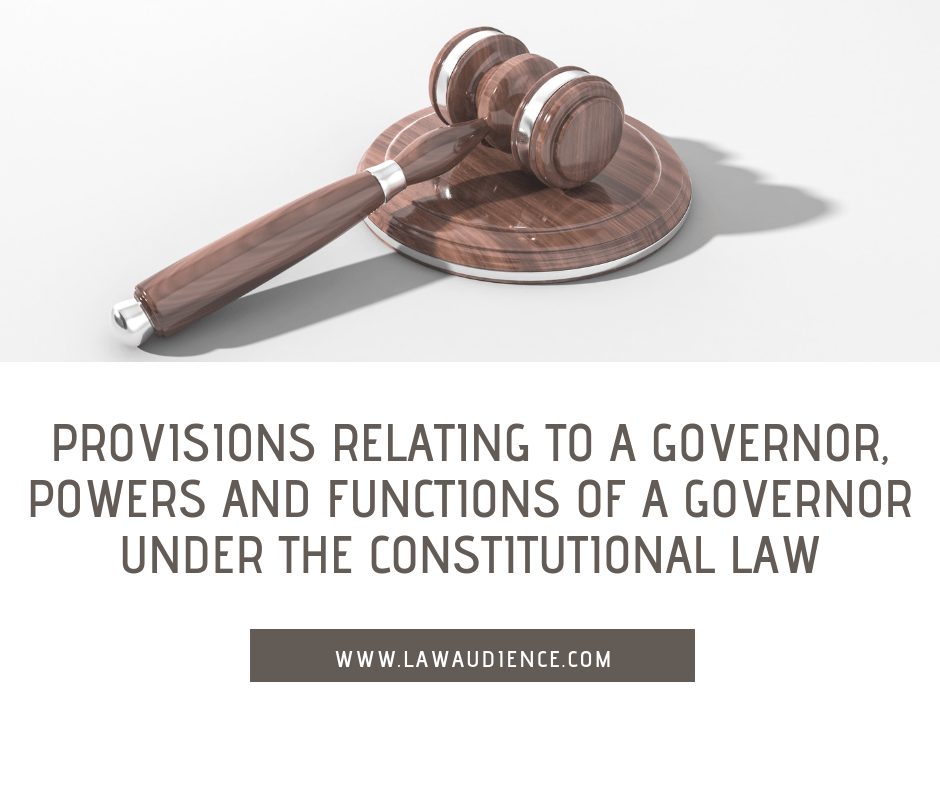AUTHORED BY: MS. RISHITHA.K, B.B.A.LL.B, 3RD YEAR STUDENT AT IFIM LAW COLLEGE & RESEARCH WRITER AT LAW AUDIENCE.
This article explains the provisions relating to governor, powers of governor, functions of governor under the constitutional law. Governor is the highest-ranked official, who has executive powers which work in accordance with the tenets of the constitution for the welfare of the people.
I. PROVISIONS UNDER THE CONSTITUTIONAL LAW:
a) THE SAME GOVERNOR CAN BE APPOINTED FOR TWO OR MORE STATES ( ART. 153):
Every State shall have a governor and two or more states can have the same person as their governor. According to the Constitution, it is not arbitrary. E.S.L. Narasimhan was appointed as the governor for both Andhra Pradesh and Telangana[1].
b) THE EXECUTIVE POWER OF THE STATE (ART 154):
The governor is vested with executive powers he discharges it either directly or through his subordinates. The governor will not have any special powers transferred by any other law. Nothing shall prevent Parliament or the Legislature of the State from conferring by law functions on any authority subordinate to the Governor[2].
c) THE APPOINTMENT AND TERM OF OFFICE OF THE GOVERNOR (ART 155 & 156):
The governor shall be appointed by the president of India. He shall hold the office for a period of 5 years. He can resign once he sends a hand-written letter to the president regarding his resignation[3].
d) ELIGIBILITY (ART. 157):
Only a person who is a citizen of India and is above the age of 35 years is deemed to be fit to be considered for the post of Governor of State[4].
e) CONDITIONS OF GOVERNOR’S OFFICE (ART. 158):
The governor of a state shall not be a member of parliament of the house of the legislature, if he is, he should vacate his seat before entering the office as a governor. The Governor shall not own an office for profit. The governor is entitled to certain allowances wherein he need not pay the rent of his official residences and his deemed to get his allowances until he holds the office[5].
f) OATH OR AFFIRMATION BY THE GOVERNOR (ART. 159):
A Governor is supposed to take an oath before the Chief Justice of the state before assuming the office.
The oath is:
“I, A. B., do swear in the name of God that I solemnly affirm will faithfully execute the office of Governor (or discharge the functions of the Governor) of …………. (Name of the State) and will to the best of my ability preserve, protect and defend the Constitution and the law and that I will devote myself to the service and well-being of the people of………… (Name of the State).[6]”
g) DISCHARGE OF THE FUNCTIONS OF THE GOVERNOR IN CERTAIN CONTINGENCIES (ART 160):
The President has the power to discharge the functions of the Governor at the time of any contingency[7].
h) POWER OF THE GOVERNOR TO GRANT PARDONS (ART 161):
The Governor has the power to grant pardons and remit the sentences of convicts but he doesn’t have the power to pardon death sentences like the president of India[8].
i) EXTENT OF EXECUTIVE POWER OF STATE (ART.162):
The executive power of the state shall extend in matters with respect to which the legislature has interfered. But the powers of the executive is not superior to that of the legislature if the legislature makes any laws which limit the power of the executive, the very same laws have to be obliged[9].
j) COUNCIL OF MINISTERS TO AID AND ADVISE THE GOVERNOR (ART.163):
There shall be a council of ministers headed by the chief minister to aid and advice the governor. Any decision made by the governor shall be deemed as final and the validity of the very same cannot be questioned. No court can enquire matters regarding the advice rendered by the ministers to the governor[10].
k) AUDIT REPORTS (ART. 151):
The reports relating to the accounts of the State compiled by the Comptroller and the Auditor General of India will be submitted to the Governor of the State and then the reports will be laid down before the legislature of the State.
l) APPOINTMENTS BY THE GOVERNOR:
- The Chief Minister is appointed by the Governor and the Council of Ministers is appointed by the governor on the advice of the Chief Minister[11].
- The Advocate General will also be appointed by the Governor of the State[12].
- The members of the legislative council of the state can also be elected by the Governor[13]. The members who are elected by the Governor should have special knowledge or practical knowledge in the fields of Literature, science, art, co-operative movement and social service.
- The district judges of the State shall be appointed by the Governor of the State in consultation with the High Court[14].
m) SESSIONS OF THE STATE LEGISLATION (ART. 174):
The Governor has the power to summon, prorogue the house or either House. He has the power to dissolve the legislative Assembly[15].
n) ASSENT TO BILLS (ART. 200):
When a bill has been passed by the legislative assembly or the legislative Council, it will be presented to the Governor for his assent. The Governor can either give assent to the bill or withhold the assent and reserves the bill for the consideration of the President[16].
o) IMMUNITIES FOR THE GOVERNOR:
The Governor is not answerable to any Court in for the performance of his powers. No criminal proceedings shall be instituted against the Governor during his term of office. No process for arrest or imprisonment of a Governor shall be issued during his tenure. No Civil proceedings shall be instituted against the Governor[17].
p) REMOVAL OF THE GOVERNOR:
The Governor cannot be removed after a new government comes to power after the elections. This mode of removal is found to be unreasonable and arbitrary. The Hon’ble Supreme Court has held that a governor can be replaced under only compelling reasons[18].
Thus, the Governor of a state plays a vital role in efficient functioning of the state by discharging his duties in accordance to the constitution.
[1] INDIA CONST. art. 153.
[2] INDIA CONST. art. 154.
[3] INDIA CONST. art. 155 & 156.
[4] INDIA CONST. art. 157.
[5] INDIA CONST. art. 158.
[6] INDIA CONST. art. 159.
[7] INDIA CONST. art. 160.
[8] INDIA CONST. art. 161.
[9] INDIA CONST. art. 162.
[10] INDIA CONST. art. 163.
[11] INDIA CONST. art. 164.
[12] INDIA CONST. art. 165.
[13] INDIA CONST. art. 171.
[14] INDIA CONST. art. 223.
[15] INDIA CONST. art. 174.
[16] INDIA CONST. art. 200.
[17] INDIA CONST. art. 361.
[18] B. P. Singhal vs Union of India, TP (Civil) No.663 of 2004.



